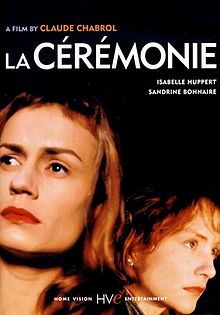La C%C3%A9r%C3%A9monie
La Crmonie is a 1995 film by Claude Chabrol, adapted from the novel A Judgement in Stone by Ruth Rendell. The film echoes the case of Christine and Lea Papin, two French maids who brutally murdered their employers wife and daughter in 1933, as well as the 1947 play they inspired, The Maids by Jean Genet.
Once in the small village, Sophie meets Jeanne Isabelle Huppert, the postmistress, who occasionally works in a charity and reads a lot. However, Jeanne proves to be a bad influence on the maid since she is jealous and aggressive towards a lot of people, including the Lelivres, whose mail she vandalises. She also has a violent history. The two friends meet regularly either for a charity project that they end up ruining or for a film television being Sophies main pastime. Sophie is treated rather nicely at the Lelivres, who mean well towards her, but their patronizing attitude and the affection they have for each other create a feeling of jealousy and frustration both in Sophie and in Jeanne. This frustration reaches its climax when Georges fires Sophie for attempting to blackmail Melinda, who found out about her illiteracy. It is what triggers the climax of the film, which sees Sophie and Jeanne seize Georges shotguns and murder the family who were watching an opera on television.Jeanne leaves the crime scene and is killed in a car accident by the priest who had fired her from the charity she worked for. Sophie, for her part, walks away from the house after having wiped their fingerprints off the guns, making her way through the police squads at the accident. The end credits begin with the music of the opera that is being played back by a policeman on Melindas taperecorder, which Jeanne stole and put in her car. At the end of the credits, the gunshots can be heard on the tape and then the voices of Jeanne and Sophie, constituting evidence against them. Chabrol presents an ambiguous view of culture and class conflict in this film, which he jokingly called the last Marxist film. ........
Source: Wikipedia







